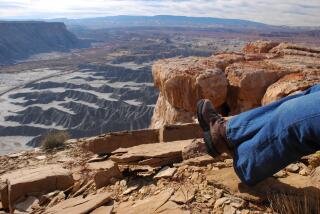Congress Approves Nevada Public Lands Bill
Congress gave final approval Wednesday to wide-ranging lands legislation that sells off federal holdings in one of Nevada’s least-populated counties, creates more than a dozen wilderness areas in the state and eases the way for a controversial water project.
Returning this week after an election recess, the House passed a Senate-amended version of a public lands bill that rewards an array of Nevada interests, including water utilities, wilderness buffs and developers. The bill was sent to President Bush for his signature.
The legislation grants rent-free rights of way across federal land for a massive proposed pipeline system that would carry groundwater from rural Nevada to the Las Vegas area.
It authorizes the sale of 90,000 acres of public land -- the equivalent of three San Franciscos -- for private development in Lincoln County, a huge, lonely swath of southeastern Nevada that is almost entirely owned by the federal government.
It establishes 768,000 acres of wilderness in Lincoln County, among the largest blocks of wilderness to be designated by Congress in the last decade.
And it eliminates a federal right of way that interferes with a big Southern Nevada development proposed by a friend of one of the bill’s sponsors, Democratic Sen. Harry Reid, the soon-to-be Senate minority leader.
“This bill is the epitome of compromise,” said Nevada Republican Rep. Jim Gibbons. “We succeed in raising the private property tax base a modest amount while protecting an unprecedented amount of land. I am especially pleased that it will specifically support economic development, increased recreation and new tourism opportunities in one of Nevada’s most rural counties.”
Senate amendments altered some provisions of the bill that had raised objections, but it remained a mixed bag from the standpoint of environmentalists.
“We didn’t get everything we wanted,” said Bart Koehler, director of an arm of the Wilderness Society. “But the areas protected are extremely significant and will be very important for future generations.”
The water pipeline and land sale provisions continued to provoke strong criticisms.
“It is really the epitome of a bad lands bill,” said Janine Blaeloch, director of the Western Land Exchange Project, a public lands watchdog group. “It pushed for privatization of federal land where there is no demand.... It does tremendous damage to the entire landscape. We’re going to lay pipelines from here to kingdom come on public land for no charge and suck water from rural Nevada down to Las Vegas.”
The pipeline rights of way are granted to the Southern Nevada Water Authority, which wants to pump water from a deep regional aquifer to supply booming Las Vegas and Lincoln County, which has a deal with a private water company to develop local groundwater to serve growth.
The pumping proposals have raised concerns that they could jeopardize rural water supplies as well as springs in Death Valley National Park, which sits on the western edge of the aquifer, just over the California border.
Water authority officials have said that although the pipeline easements will hasten the project, they neither exempt it from federal environmental reviews nor Nevada’s stringent groundwater protection laws.
The final lands bill is different in several respects from the version originally passed by the House. It drops a section that would have diverted 45% of the land sale proceeds to the Lincoln County government, instead directing most of the income to a federal account that will reimburse the Bureau of Land Management for sales and costs.
It expands the scope of a groundwater study and earmarks $6 million in Las Vegas land sales revenue to pay for the study. It increases the sale acreage from 87,000 to 90,000.
And it changes the formula for assessing the cost of eliminating a mile-wide, 15-mile-long federal easement from a large Coyote Springs parcel that Harvey Whittemore, a close friend of Reid’s, wants to develop with 50,000 homes and 10 championship golf courses.
The original bill, drafted by Reid and the Nevada congressional delegation, required that Whittemore pay “fair market value” -- and then defined the value by taking a 1988 federal appraisal and adjusting it for inflation. The Los Angeles Times reported in June that under that provision, Whittemore would have had to pay $160,000, probably a fraction of what the easement was worth.
Now Whittemore will pay according to a special formula defined by the Department of Interior’s appraisal office.
Times staff writer Chuck Neubauer contributed to this report.
More to Read
Sign up for Essential California
The most important California stories and recommendations in your inbox every morning.
You may occasionally receive promotional content from the Los Angeles Times.











